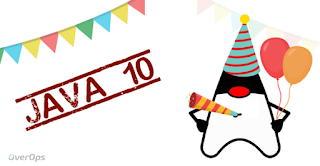
Oracle has decided to release a new JDK two times a year.
The next release of Java 10 aka 18.3 will be available in March 2018.
JDK 11 aka 18.9 will be released in September 2018. Java 11 will also be a long-term support LTS release.

Oracle has decided to release a new JDK two times a year.
The next release of Java 10 aka 18.3 will be available in March 2018.
JDK 11 aka 18.9 will be released in September 2018. Java 11 will also be a long-term support LTS release.
For Java to remain competitive, it must not just continue to move forward — it must move forward faster.
The visible change is the dawn of the keyword var. Now, instead of typing the type declaration of a local variable - local to a method, a block, or an instruction - you can use the keyword var. The constraint is that the variable is initialized at declaration. Stay tuned for more support in JDK 11.
When the type declaration is a complex generic type definition, the var shortcut is a boon. The code is less verbose and the legibility is at least as good. When the type is a class name, I got the impression. the benefit is less clear.
As an exercise, I updated the source code of open source libraries which I have written and the associated tests as in
Event <Events> event = new Event<>(Events.AA_AB);
var event = new Event<>(Events.AA_AB);The first impression is that the new construct sometimes simplifies the code of the library and very often improves the test cases. Perhaps it takes time until I am accustomed to the new way of writing Java code.
The source code of the JDK is consolidated into one repository. It makes development work more efficient.
The garbage collector shall have a clear and documented API. Developing and adding new garbage collectors is easier.
Various updates, such as the Unicode newest version. The extensions are used in library classes to better support locales.
Open JDK and Oracle JDK are slowly merging. For example, Oracle will provide CA certificates to OpenJDK.
The rhythm of releases is staggering higher. Starting Spring 2018, we will have * The new rule as blogged by Mark Reinhold Moving Java Forward Faster. * You will get a new JDK every six months * You will get security updates every three months * You will get a long-term support release every three years.
This means that you shall update your JDK in a development environment six times a year if you want to install the new JDK and the security releases. We recommend automating the process in your environment. And you shall deliver your applications in Docker containers to support the whole ecosystem.
The tool landscape is still struggling to adapt to the new rhythm. I am working with IntelliJ IDEA, and I had to wait for the EAP 2018.3 before being able to write JDK 10 code in the IDE. I use Gradle as a building tool and also to wait until JDK 10 was at least partially supported. And I am still waiting for the update of the code coverage plugin. Before that, I was back to stone age, writing software with a text editor and compiling it with the command line.
The library landscape is often behind. They are regularly incompatible with the newest version of the JDK.
JavaFX will be removed from the regular JDK distribution in Fall 2018.
The cloud landscape does not support the latest JDK as SAAS. You must provide your custom docker images with the expected JDK or JRE. So we are back to IAAS.